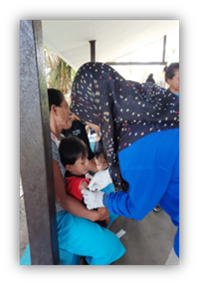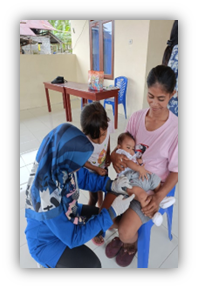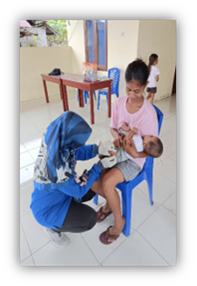The district of West Halmahera stands out for its subpar performance in part due to caregivers' reluctance to subject children to multiple injections due to concerns over potential side effects and doubts about the safety of administering multiple injections in a single visit. Caregivers often express concerns about the safety of multiple injections and post-injection side effects. On 4 February 2023, WHO Indonesia and the District Health Office in West Halmahera, conducted a field visit to Puskesmas Baru in response to a confirmed pertussis case. This visit encompassed diverse activities, including coordination meetings with Puskesmas personnel, advocacy meetings with Ngawet village leaders, rapid convenience assessment (RCA), technical assistance for both immunization and surveillance officers, and the monitoring of routine immunization services at the Posyandu.
“It’s hard to conduct house-to-house/catch-up immunization to reach unimmunized children because many parents in our area frequently go to the forest frequently, often taking their children along with them. This makes it difficult to find them at home for vaccination. To ensure complete immunization of children, we educate parents about the effectiveness of timely immunization and the safety of multiple injections. Some parents worry about the side effects of administering more than one injection to their children at one visit,” said Hairia, the Immunization officer of Puskesmas Baru. This is a common issue that has been raised by immunization officers based on their experience. The immunization officer needs to share their knowledge and encourage parents to consider multiple injections and complete basic immunization for their children.



Hairia, immunization officer at the community health centre (Puskesmas) Baru gives multiple injections to a 3-month-old baby for DPT-HB-Hib2 and PCV1. She carefully explains multiple injections to the parents and gives them information about PCV, its benefit, and the safety of multiple injections. WHO/Hermansyah
Immunization is a cost-effective intervention to prevent children from vaccine-preventable diseases. During an outbreak, especially when conducting outbreak response immunization and catch-up immunization, administering multiple injections becomes pivotal to ensure comprehensive immunization coverage. Primus, the Head of Puskesmas Baru in Ngawet village, echoed the importance of reaching every child and securing their immunization: “It’s important to reach every child and give them immunization, to achieve our target we need to enhance the participants of the community, involve religious and local leaders, and deliver massive announcements to the church when the immunization services are held because we don’t want to outbreak happen in our area."
Catch-up immunization and multiple injections are integral components of the routine immunization programme, especially during an outbreak. Clear information and messages delivered by health workers to parents and communities play a pivotal role in building trust and acceptance of multiple injections, subsequently leading to improved coverage. WHO provides support to increase the capacity of health workers, including educating caregivers through on-the-job training, enhancing their knowledge and skills in mass communication, sharing guidance materials, and emphasizing the importance of open two-way communication with caregivers.
Fortunately, during monitoring sessions at the Posyandu, most parents accepted multiple injections once provided with clear explanations from immunization officers regarding new vaccines and their benefits. Although building trust around the safety of multiple injections and the significance of complete immunization requires time, consistent communication with parents through community engagement is pivotal in increasing acceptance rates.
This activity is supported by the Australian Government
Written by Hermansyah, Vaccination Technical Officer, WHO Indonesia
